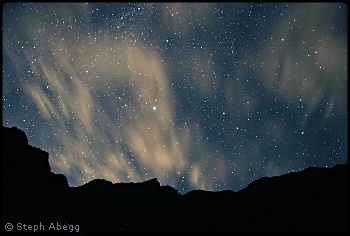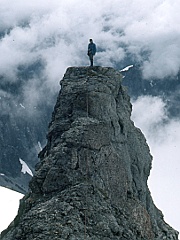|
|
|||||||||||||||
 |
||||||||||||||||
 |
||||||||||||||||
|
||||||||||||||||
I am already a sweaty mess when Ron suggests that we leave the Curry Gap trail and head up the ridge that will take us to the east face of Kyes Peak (the tallest peak in the Monte Cristo range), where he is certain we will forge a new route. I was excited when we headed out in the morning, less so when a washed-out bridge added two miles of dusty road hiking, and anticipation has turned to aggravation as we struggle up through the slide alder and devil’s club. My hand is pock-marked with little stickers, my back is itchy with dried hemlock needles and my forehead bumpy with mosquito bites. When finally we crest the ridge, Ron douses all enthusiasm when he says, “Well, hell, this is the wrong ridge.” Ron is never wrong, his planning always meticulous. I am the one who stumbles head down into trouble, but I take no satisfaction from the role reversal. We can’t stay on the ridge, it is too late to retrace our steps. We will have to camp somewhere down in the Pride Basin. A steep meadow gully leads down to a grassy knoll and stream. Unfortunately, the greenery is primarily false hellebore, which squishes slick under my boots. Feet fly out from underneath me, I do a butt plant and swear. This process is repeated all the way to the grassy knoll. Bruised and cranky, I pull out my sleeping bag and lie down and close my eyes until the mosquitoes find me. Swatting and swearing, I take out dinner, a spam and cheese concoction, and wash it down with grape Kool-aid. Ron and I look up at Kyes Peak. We will be able to approach it from our camp tomorrow, but there will be no first ascent. At dusk, I give in to exhaustion and crawl into my down bag. I am faced with a dilemma. It is still warm out, a bit humid, too warm to zip up the bag, but the mosquitoes are partying hearty. Sleep in a sauna or sacrifice my face to the bloodsuckers? I choose the former, zip up and am soon adrift on a sea of tranquility, sleeping the sleep of the dead: no dreams, no tossing or turning, no thoughts of peeing. Suddenly the most god-awful gut wrenching scream I have ever heard shatters the night quiet. Shocked awake, heart pounding Alien style, I rock and roll, trapped in my sweaty wet bag. Hysterically tearing at the zipper, I manage to work it loose and emerge into absolute darkness, no moon. I whisper, “Ron, what was that?” “That was me.” “What the hell! You scared me to death.” “Shh, Shh,” he says. Up in the woods above us, something is careening down slope, breaking branches and woofing loudly toward our campsite. I conjure up an image of the granddaddy of all grizzlies, gigantic jaws ready to snap my head off, and, momentarily, it will emerge and make dream reality. Never mind that the last grizzly in the North Cascades was killed 50 years ago. I have never been so frightened my life. And still I can see nothing, just Ron’s shadow. There is nothing in his voice that betrays fright. He stares stoically into the ominous gloom. Me, I need a weapon—where is my ice axe? I turn around to find a menacing shape looming in the dark. Screaming, I fall back against Ron. That son-of-a-bitch sneaked up behind us. Okay, so it was my parka draped over my pack; it’s a big parka. Every nerve ending in my body is electric and humming. Crouched and holding my ice axe, I wait. Ron yells, “Get your flashlight.” “I don’t want to see it!” “Get your flashlight, damn it.” Ron has become a bit testy. Brandishing the ice axe I reach back for my flashlight, which thankfully is almost dead. I cast the six-inch beam in all directions before Ron says, “Turn it off.” Did I hear him mumble, idiot? In the meantime, the sound has altered course. We both realize that whatever was up in the woods heard us and is moving away. My heart skips. I am not going to die. As we listen, I suggest to Ron that he yell as he had earlier, just for safe measure. He does, a rolling guttural scream that starts out bass and ends up a soprano warble: I call it the death yodel. I am chilled once again, but the noise gets fainter and fainter and then is gone.
A half-hour later, my heart slowed from agitato to largo, Ron and I are able to laugh about our encounter with not-so-gentle Ben. Ron kids me about my near hysteria, and I have to laugh. Slowly exhaustion overwhelms adrenaline. Climbing back into my bag I fall into fitful sleep. Periodically, I am awakened, terrified every time, by the sound of what I think is bear, but is merely Ron’s snoring, an extended pinched snort, as if he is attempting to suck the contents of each nostril into his brain. I will not be able to sleep. In the morning achy-headed and slinky-eyed, I trail behind Ron to the summit of Kyes, back to camp, up the gully, down the ridge and back to the car. As we drive home, we have no first ascent, but we have one helluva bear story. For years I tell the bear story, and my terror becomes more comical with each telling. One day Ron and I are presenting a slide show to a group of high school students. I tell the bear story. When I finish, Ron says, “Tell the rest.” I look at him, puzzled. “What rest?” “Tell them why I yelled, why I was scared.” I stare at Ron in disbelief. “You never told me why you were scared. I didn’t even know you were scared.” The students are as confused as me and Ron says, “I screamed because the sound I heard coming down the hill was this.” He woofs and slowly clomps his feet down on the floor. I am stunned and scared in broad daylight. “You mean it was walking on two feet?” “Yeah,” he says quietly. Bigfoot? Over the next twenty years I wait for Ron to say “Gotcha.” But he never does. Whenever we reminisce about that evening he shakes his head and says, “I’d never heard anything like that before.” Never a hint of a smile. He tells the story to other friends and they remark on his sincerity. I regale friends and students with the Bigfoot story, and they laugh at my whimpering, stumbling wussiness. I am all-too willing to play the clown, but it is Ron I wanted to be that night, cool and calm in the face of the unknown. At his house a couple of weeks before he succumbs to ALS, Ron recalls, again, that ominous clomping noise and the mystery of it all. His voice is weak, but his eyes light up at the memory. The night before he dies, Ron is lying in a hospital bed surrounded by friends and family. He calls me over to his bed and tries to tell me something, but the oxygen mask muffles his voice and I can only smile and clutch his hand. Six years ago, when I wrote about Ron, less than a year after his death, I wondered what he had been trying to tell me. His eyes were large; there was an urgency to the words I couldn’t make out. I have come to believe, or want to believe, that his words were, “It was all true.” Or more importantly, “Don’t be afraid.” |
||||||||||||||||
| ©2010 Northwest Mountaineering Journal | ||||||||||||||||
| Site design by Lowell Skoog | ||||||||||||||||

